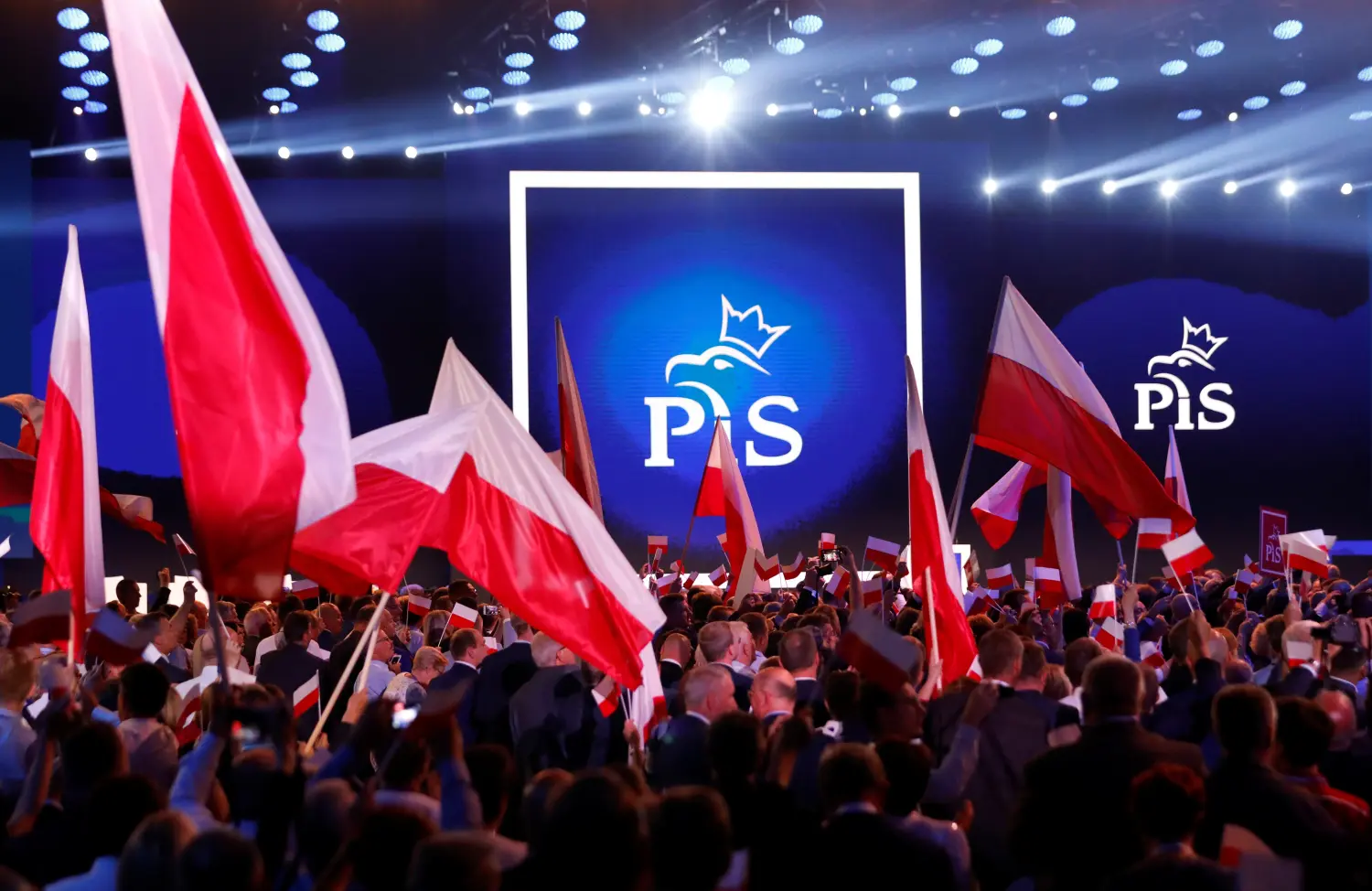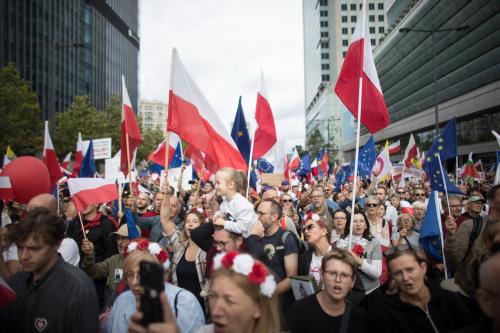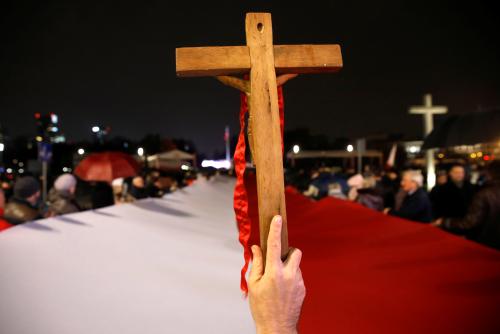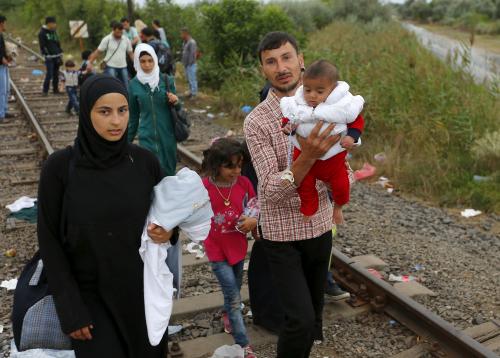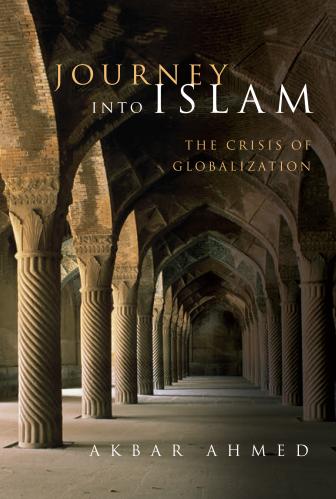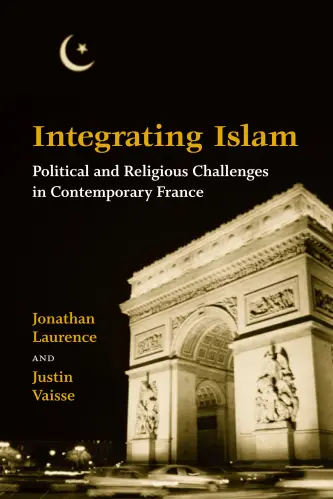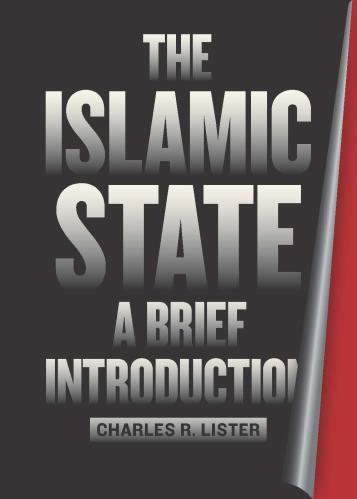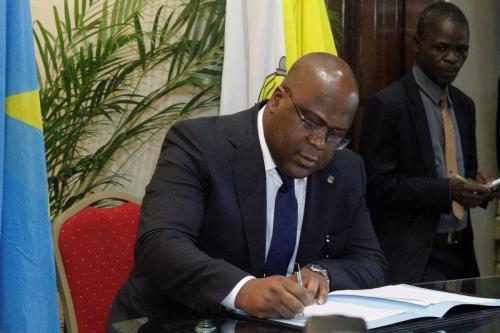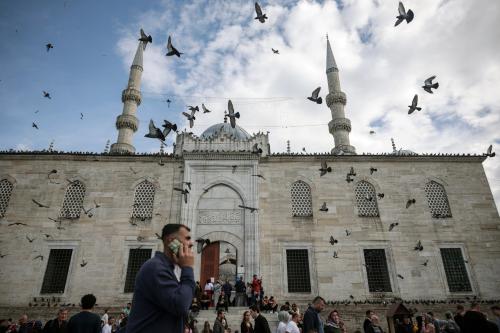This working paper is part of a multi-year Brookings project—”The One Percent Problem: Muslims in the West and the Rise of the New Populists.” Other papers in the series are available here.
Contents:
- Political landscape of the right
- “The Bulwark of Christianity”
- Refugees and the rise of the Law and Justice Party
- Muslims in Poland
- Attitudes toward immigrants and refugees
- Right-wing supporters in their own words
- Conclusion
Poland has almost no Muslims. At less than 0.1 percent, it has the smallest number of Muslims out of the countries covered in the Brookings project on Islam and populism, even less than Hungary. Yet, the question of Islam and Muslims and what it means for Polish society and for Poland’s place in Europe has increasingly featured in the country’s political debates. This paper examines how Polish right-wing parties perceive Muslims in general and Muslim immigrants in particular from 2015 onward. 2015 not only marks the country’s most recent parliamentary elections, but also the beginnings of the European Union’s migration crisis.
Our paper begins with an overview of the present and past of the Polish political system. We can then better determine what constitutes a “right-wing” party. In the next section, we explore the ways in which the events of 2015 shaped the right with respect to Muslims and Islam. We then outline the situation of Muslims in Poland and the country’s unique paradox: while Muslims are a heated topic in Poland, their presence in the country is minimal. Toward the end of the paper, we discuss polling on Polish attitudes toward immigrants, followed by an analysis of attitudes on Islam and Muslims expressed by right-wing parties. The paper draws on semi-structured interviews with right-wing activists and representatives, social media activity (mainly Twitter), statistical data, political party documents,1 and public speeches.2
Political landscape of the right
Since its 1989 democratic transition, right-wing ideologies have had a strong presence in Poland, arguably a natural reaction to 45 years under communism. Nevertheless, right-wing parties were relatively small and short lived from the fall of the Soviet Union until 2005. The two largest political parties on the right side of the spectrum since the 2005 elections have been Civic Platform (PO, Platforma Obywatelska) and Law and Justice (PiS, Prawo i Sprawiedliwość).
Both parties emerged in 2001 and were founded by politicians from the anticommunist opposition. While PiS represents a more traditional conservative ideology, PO represents liberal-conservative positions. Today, PiS is considered a right-wing populist party, whereas PO has moved significantly to the center.3
In the 2015 parliamentary elections, PiS lists also included the candidates of two other parties, Agreement (Porozumienie) and United Poland (SP, Solidarna Polska). PiS claimed victory in the 2015 parliamentary elections, obtaining 37.6 percent of the vote, 235 out of 460 seats in lower house of the Polish parliament, and 61 out of 100 seats in the Senate. This was a significant increase from the 29.9 percent they won in the 2011 elections.
While PiS has about 34,000 members, Agreement is a smaller conservative party established in 2014 under the name Poland Together, with about 2,000 members. Agreement defines itself as a party aiming to place Poland’s common good above particular, individual, or group interests. It is the least radical member of the group. Solidary Poland, registered in 2012, has about 5,000 members. The party has a close relationship with a conservative part of the Polish church. SP is the most radical member of the group in its rightist ideology.
Claiming to focus on the needs of ordinary Polish citizens instead of the so-called liberal, internationalist elite, PiS and the government writ large can be described as populist. On the farther-right, there is the alliance of the far-right and right-wing populists that founded the National Movement (RN, Ruch Narodowy) in 2012, becoming an official party in 2015. RN won 10 parliamentary seats in the 2015 elections. Though several splits weakened their parliamentary representation, the party remains active outside parliament.
When we use the term the right, or right-wing, we are referring to all parties of the right (i.e., PiS, SP, Agreement, and RN). The radical part of the right consists of RN and a significant part of both PiS and SP. The characteristic features of the Polish right include: attachment to the idea of the Polish nation, Euroscepticism, the Christian tradition of Europe, maintaining good relations with the Catholic Church, and the promotion of conservative family values.
“The Bulwark of Christianity”
Moreover, the Polish right is against the admission of refugees from the Middle East and Africa. What distinguishes the radicals, is their uncompromising brand of nationalism: they oppose all immigration to Poland.
Right-wing parties appeal to three major themes in Polish history. First is the threat of Europe’s Islamization harkening back to the Battle of Vienna in 1683, in which the Polish-Austrian army defeated the Turks. The myth of Poland as the bulwark of Christianity (antemurale Christianitas) was built around this victory. Second, Poland has a centuries-old tradition of coexistence of various ethnic groups, cultures, and religions, including not only indigenous inhabitants but also settlers from other regions. The first Jewish communities in Poland were established in the 13th century. In 1334, King Casimir the Great created new laws to further protect Jews and invited those who were persecuted elsewhere in Europe to Poland. Poland became a haven for Jews expelled from other countries, forming one of the largest Jewish diasporas in the world—home to three million by 1918.4 In the 16th and 17th centuries Poland also became a refuge for Protestants. The Jagiellonian dynasty, which reigned from the 14th to 16th centuries, built a powerful empire centered around three seas. The Jagiellonian dynasty was able to incorporate a wide diversity of peoples, religions, and cultures, established primarily through peaceful agreements. The more moderate elements of the Polish right refer to the legacy of the “Jagiellonian idea” today.
World War II drastically altered the ethnic composition of Polish society. Only 10 percent of Poland’s three million Jews survived the systematic attempted annihilation of Europe’s Jews by the German occupiers during the Holocaust.5 Most survivors emigrated to Israel, the United States, and Latin America. Under the agreements of the Yalta conference, Polish borders shifted to the West, resettling both the German population from western Poland and the Polish population from the lost eastern territories. This resettling together with the Holocaust, created an almost homogeneous ethnic population.
Third, throughout various points in history, Poles have managed to preserve their culture and fought for their independence. Most notably, in 1772 Poland was divided between Russia, Prussia and Austria, ceasing to exist for 123 years. Nevertheless, Polish identity persisted through the preservation of Polish culture, language, and religion. The struggles for independence during the partitions, the two world wars, as well as resistance to the communist regime are a subject of pride, connected with “the love for freedom” emphasized in Polish culture.6
The experience of resisting the territorial designs of neighbors from the East and the West shaped the Polish distrust of Russia and Germany as well as a certain hypersensitivity to Russian-German cooperation. This contributes to the Polish right’s fear of subordination to the European Union, in which Germany dominates. Nevertheless, the Polish public supports Poland’s membership in the EU; only the National Movement explicitly calls for “polexit.”
Refugees and the rise of PiS
Polish attitudes toward Muslims have played an increasingly important role in recent Polish politics, particularly in PiS’s rise to power in 2015 and Polish reactions to the EU refugee crisis more broadly.
PiS won both the presidential and parliamentary elections in May and October 2015, respectively. In May 2015, the first European Agenda on Migration of the European Commission proposed distributing 40,000 refugees between EU member states.7 In September 2015, the suggested total number tripled up to 120,000.8 Initially, in May, Poland was expected to receive 1,000 refugees. That number later rose to 9,000. During a vote by Ministers of Interior at the EU summit on September 15, 2015, the Polish minister was the only one from the four Visegrad countries to vote in support of the EU relocation plan according to mandatory criteria.9 The leaders of the Visegrad Group openly criticized the Polish government and the group was in danger of a split.10
In July 2015, then Prime Minister Ewa Kopacz announced: “Poland will receive 2,000 refugees. It is an expression of European solidarity.”11 During the October parliamentary elections, refugees became a charged topic. PiS argued that refugees were a problem for Europe to deal with, not Poland. Civic Platform, PiS’s main competitor, discussed the issue more cautiously. A month before the parliamentary elections, then Prime Minister Ewa Kopacz of Civic Platform declared that Poland would admit refugees, but not economic migrants,12 still three months earlier she stressed that admitted Syrian families would be Christians.13 PiS was victorious in the 2015 elections and formed a government. A month later, Beata Szydło, the new Prime Minister, wrote:
“The refugee crisis also reminds us that we shall be clear on the issue of solidarity. Solidarity consists in sharing good practice and being ready to provide support in emergency or crisis situations…However, one cannot call solidarity the attempts to export the problems that some states had brought up, without any involvement of other states to be burdened with them.”14
Unfortunately, no data is available on the specific factors shaping Polish voting behavior in these elections. However, the Polish National Election Study (PNES) carried just after the 2015 parliamentary elections, indicated that party constituencies were grouped along their opinions on immigration.15 PNES respondents placed their position on a seven-point scale where one meant “authorities should encourage non-nationals to settle” and seven meant “authorities should prevent settlement.” The average value among PiS voters was 5.28, among PO voters 4.20, and among voters of Modern (Nowoczesna) 3.71. This cleavage appears to be holding over time. In June 2018, PiS voters were most opposed to admitting refugees, with 92 percent against.16 A majority of Modern (60 percent) and PO voters (51 percent) supported the admission of refugees.
Muslims in Poland
Muslims in Poland number between 10,000 and 80,000.17 The chronological order of different reports seems to suggest that the Muslim population is growing. We estimate that the most reliable current number is around 50,000 (0.13 percent of a population of 38 million, compared to 89 percent Christians.18
Muslim history in Poland begins in the 14th century with the settlements in the Grand Duchy of Lithuania, which at the time was united with Poland. The first Muslims were Tatars from the Golden Horde. From the beginning of the 1500s until the 1980s, the small number of Polish Muslims were almost exclusively Tatars who were granted land in exchange for military service. In north-eastern Poland, mosques and cemeteries built by the Tatar settlers and their descendants have been preserved until today.
Before World War II, Polish Muslims numbered around 5,500,19 representing one of the smallest religious groups in the country.20 After the war most of the old Tatar settlements remained outside of Poland. In 1947, the Muslim Religious Association (founded in 1925) was resuscitated. Later, the 1970s and 1980s saw a wave of students from Arab countries entering Poland. Their estimated number in the academic year 1988/89 was around 2,500.21 Most of them returned to their countries after completing their studies, but some stayed in Poland, often marrying Polish women. These immigrants constitute an intellectual elite, many of them being doctors or engineers.
The political transformations of 1989 began a new period. Following the outbreak of the Chechen War in 1994, and particularly after the second Chechen War of 1999, Poland received around 100,000 Chechen refugees. Under the provisions of the Dublin II Convention, they found protection in Poland during the wars, and almost all left thereafter.22
Poland’s Muslim population today traces itself to many countries. The most recent wave of immigrants hail from Syria, Iraq, Bangladesh, and post-Soviet countries such as Chechnya, Tajikistan, Uzbekistan, Kyrgyzstan, Afghanistan, and Georgia. The five largest Muslim organizations’ membership sums up to a total of almost 5,000.23Muslims are Poland’s least accepted ethnic or religious group compared with Jews and Roma. According to a poll by the Pew Research Center in 2015-2016, roughly four-in-ten Polish adults say they would not want Muslims to be citizens of their country (41percent), their neighbors (43 percent) or members of their family (55 percent).24 A recent poll reveals similar attitudes toward Arabs, although it is difficult to determine whether the negative attitudes concern primarily ethnicity or religion. Among Poles, 65 percent express dislike of Arabs, 14 percent indifference, with only 13 percent expressing favorable attitudes (the comparable numbers for Roma are 57 percent, 21 percent, 17 percent; Russians 43 percent, 25 percent, 28 percent, and Jews 33 percent, 28 percent, 31 percent).25 Yet only 12 percent of Poles have ever met a Muslim. Poles who are better educated, wealthy, secular and left-wing are more likely to have met a Muslim. Research suggests that contact with Muslims mostly takes place during trips abroad.26
Attitudes toward immigrants and refugees
The Polish labor market also plays a large role in shaping how Poles view immigrants and refugees more generally. Three major demographic shifts have transformed the Polish labor market: an aging population, a low fertility rate (1.45 in 2017),27 and economic emigration after Poland’s accession to the European Union in 2004 (in 2017 the overall number of emigrants totaled 2,540,000).28 These changes have shrunk the labor force, while increasing the demand for manual labor. As a result, economic migrants have since moved to Poland in growing numbers, the largest group being Ukrainians who number up to three million.29 Poland’s attractiveness as a destination for economic migrants is also the result of the relatively recent liberalization of pertinent labor regulations, including the possibility of working on the basis of an employer’s declaration, simplified work permits, and visa-free travel for Ukrainians.30 Economic migrants aside, foreigners with the right to reside in Poland at the beginning of 2018 amounted to over 325,000 people, with 1,351 of those under refugee status and 2,042 with subsidiary protection.31
Let us turn to the attitudes of Poles toward refugees from the 2015 refugee crisis onward32 In May 2015, 53 percent of Poles opposed the entry of refugees from the Middle East and Africa, while 33 percent of respondents were in favor. In the months that followed, the rate favoring the admission of refugees rose. In September 2015, the rate of opposition fell to 48 percent, and the percentage of supporters rose to 46 percent. However, from this point on, opposition to admitting refugees rose significantly. By June 2018 almost three quarters (72 percent) of respondents opposed relocation of refugees to Poland, with almost half (46 percent) strongly against it. Slightly more than one fifth (22 percent) of Poles supported admitting refugees, with only five percent expressing strong support.
The question is whether Poles are against refugees qua refugees, or whether they particularly oppose refugees from the Middle East and Africa
The question is whether Poles are against refugees qua refugees, or whether they particularly oppose refugees from the Middle East and Africa (who would be primarily Muslim). In the same survey, the Public Opinion Research Center (CBOS) asked about attitudes toward admitting refugees from Ukraine remaining in armed conflict with pro-Russian separatists supported by Russia, and the results were remarkably different. Over half (56 percent) of respondents agreed that Poland should accept refugees from Ukraine, with 35 percent opposed. Moreover, Polish public opinion on Ukrainian refugees has been stable since October 2015, further suggesting that the reluctance to accept refugees from the Middle East and Africa is related to their origin.
This interpretation is reinforced by another CBOS survey conducted in February 2018, in which Poles were asked about various national, ethnic or religious groups.33 Respondents expressed their opinions on 24 groups, including Europeans and Asians, Americans, as well as Jews, Roma, and Arabs. Of all the groups, Arabs were the least liked. 62 percent of respondents expressed aversion to Arabs, 15 percent were indifferent, and 10 percent expressed favorable attitudes. By comparison, Czechs were the most liked group, with 14 percent of respondents expressing dislike, 31 percent indifference, and 44 percent expressing favorable attitudes.
According to Bart Bachman, Poles have consistently held some of the most pro-immigration views in Europe. This makes the opposition to specifically Muslim immigration all the more striking. The discrepancy might stem from the historically strong role religion has played in the formation of Polish national identity. Bachman argues that Poles may also be unsympathetic to the idea of EU burden-sharing as the Polish economy lags far behind Western Europe’s. In 2014, Poland’s GDP per capita stood at 68 percent of the EU average.34 Nevertheless, according to another survey, a plurality (43 percent) of Poles believe that it is possible to find a common level of agreement between Islam and Western culture.35 However, 34 percent of those surveyed predicted that serious conflict was inevitable—an increase of 15 percentage points between 2006 and 2015. Reactions to various statements about Muslims point to an image of Muslims as intolerant, unwilling to assimilate, and supporting violence. At the same time, about half of Poles believed that the majority of Muslims opposed terrorist attacks.36 The relatively tiny minority of Poles who had personally interacted with Muslims were less likely to associate Islam with violence and also demonstrated greater sympathy for Muslims offended by jokes directed against Islam.
Right-wing supporters in their own words
We conducted 14 semi-structured interviews, primarily with members of right-wing parties or party supporters. One interview was conducted with a representative of the Catholic Church and two with representatives of the Muslim community. In addition, we analyzed social media activity.
Attitudes toward Muslims
Supporters of the political right believe that welcoming Muslims would harm Poland culturally. Interviewees often argued that significant cultural differences would make assimilation of Muslims in Catholic Poland difficult or even impossible.37 In this regard, right-wing opinion corresponds with that of the general Polish public, based on the survey data we discussed earlier.
At the same time, for Muslim refugees, Poland is not their preferred country of settlement—relocation to Poland would have to have been compulsory. A minimal social safety net, lengthy proceedings (usually resulting in a refusal), as well as the lack of existing large Muslim communities, reduce Poland’s attractiveness. Interviewees also stress the migratory pressure from the East, mainly from Ukraine, as justification for rejecting refugees.
Since there are so few actual Muslim refugees in the country, the vividly present topic of Muslim refugees in Polish public debate refers to refugees in countries other than Poland. Maintaining a fear of Islam encourages the PiS government to continue refusing refugees from other EU countries. Moreover, it has become a field of competition—a kind of right-wing outbidding—between PiS and the extreme right. Thus, although “we have no refugees, we have a topic of refugees.”38
Immigration policy
Although the PiS administration’s actual immigrant policy is far from severe, the party is sensitive to its base as well as its own campaign promises. Hence, the government’s policy seeks to balance satisfying the needs of employers in facilitating migrant labor, while maintaining credibility among PiS voters by rejecting refugees.
At the time of writing, the PiS government’s official immigration agenda, although announced for September 2018, has not yet been published.39 An early draft read that “Migration policy for the social and economic development of Poland must fit first of all the priorities of the labour market.”40 This caused considerable anxiety on right-wing websites and social media. The following is an example of the kinds of tweets that surfaced on nationalist accounts: “There is still a chance to get a grip, get PiS out of power in 2019, and never let them rule again because they will destroy Poland through this unreasoned economic immigration…All hope is in the National Movement.”41
Although voters have appreciated the government’s general reluctance to admit refugees,42 a segment of PiS’s core electorate has grown disappointed with the party’s ambiguous immigration policy. In future elections, PiS may come under attack by farther-right nationalists opposing any form of immigration and emphasizing that Poland belongs to Poles. Aware of this risk, in the lead up to the fall 2018 local elections, PiS aired a controversial ad on the threat posed by refugees. Yet even this was met with distrust from some in PiS’s target constituency. As one put it: “This PiS, they cheat, again they release an ad on TV saying that PO wants Muslim immigrants. Hypocrites, they let in tens of thousands. What PO wanted to do they are doing by themselves and now they pretend to be anti-immigrant. PIS = PO.”43
The dismissal of the Deputy Minister of Development Paweł Chorąży, in September 2018— shortly after he publicly admitted that Poland must receive more immigrants to maintain economic growth—suggests that the ruling party is worried about public discontent. Similarly, Deputy Minister of Labor Stanisław Szwed ignited controversy with the government’s plan to sign a bilateral agreement on the employment of workers from the Philippines, as the main immigration resource of the Polish labor market in Ukraine seemed to run out. He said “our country is culturally close to them because of Catholicism.”44 The right-wing website Magna Polonia, exaggerating the number of prospective immigrants, stated that it could “result in the actual abolition of the Polish State.” These experiences have made government officials more cautious in their public statements. When we interviewed one official, he tried to avoid answering a question about the government’s immigration policy: “You should ask minister X, he would know better. But they are all afraid … Remind me who was the one who revealed it in public? Chorąży.”45
Role of religion and the Catholic Church
Due to the perceived incompatibility of Islam and Christianity, the Catholic Church in Poland plays an important role in Polish perceptions of Muslims. The Church still enjoys considerable moral authority in Poland, where 92 percent of Poles consider themselves believers.46 However, weekly church attendance fell from 50 percent in 1990 to 38 percent in 2017.47 PiS’s party manifesto highlights the Catholic Church’s special position: “In the extremely unfavorable circumstances of the partitions…the Church was a shelter for Polishness and a substitute for a nonexistent sovereign state.”48
The Church’s role in admitting immigrants and refugees is ambiguous. On the one hand, the Church leadership has never mentioned the need to defend a collective Christian identity from Islam. Several bishops have called for empathy toward refugees, and many priests have organized aid campaigns, engaging the faithful from their parishes. On the other hand, there are priests who themselves sympathize with the right, including the radical and nationalist right. In any case, a gap exists between the Church’s teachings vis-à-vis refugees and PiS government’s policies. For example, the Church called for the establishment of so-called humanitarian corridors for refugees, but the government did not heed. Supporters of the right, even the less radical among them, whom we interviewed generally seemed inclined to follow party ideology over Church teaching.
The radical traditionalists, opposing to novelties that would threaten the Catholic specific identity, and especially those attached to the pre-Vatican II Catholic Church, do not look kindly upon ecumenical efforts. When Pope Francis signed a declaration of fraternity with the Grand Imam of al-Azhar during his historic visit to the Arabian Peninsula, one radical Christian traditionalist called the event “the birth of a great prostitute.”49 Another one wrote: “Cooperation between the Vatican and Islam. I have nothing to do with this Church anymore!”50
Radical Right activists have described Poland’s “Day of Islam in the Catholic Church,”51 which takes place annually on January 26, as “ecu-maniac events” or “heresy of ecumenism,” claiming that “interreligious dialogue leads to satanism.”52 A Catholic priest who is a member of the ultraconservative Society of Saint Pius X further noted: “The days of Judaism and Islam in the Church are the effects of the madness of ecumenism.”53
Right-wing ideology
The parties of the Polish right, despite their differences, share fundamental ideas of national identity and Christian culture. All right-wing parties refer to the primacy of the nation-state as opposed to a federalized Europe. The more moderate right-wing parties—PiS, SP and Porozumienie—do not oppose Poland’s membership in the European Union, but rather seek to drastically reform the EU to give priority to individual state decisions over EU regulations. “Great Poland in a Small Union. Manifesto of Polish Eurorealism” reads the title of a the party’s policy memo from 2014.54
By contrast, the National Movement is, by definition, a Eurosceptic group. It seeks Poland’s exit from the EU and invites guests from similarly Eurosceptic parties such as Hungary’s Jobbik, Italy’s Forza Nuova, and Spain’s Democracia Nacional for their events. While right-wing parties— with the exception of the National Movement—agree that Poland is benefiting from EU membership, they remain skeptical about the current shape of EU institutions and procedures. Echoing right-wing parties across the continent, the Polish right believes the EU requires deep reforms and perceives the body as unjust and unaccountable, dominated by old member states, particularly Germany.
In their narratives, right-wing parties emphasize national pride and the tradition of heroic struggle, such as the Warsaw Uprising and the Cursed Soldiers (armed anti-Soviet resistance in 40s and 50s)which were censored before 1989. “I am proud of us as a brave people who do not give up,” one PiS member explained. “After 123 years of non-existence as a state, we have been reborn. It is amazing to me that we have been able to keep our culture and language for so many decades. This is amazing. It was people, not institutions.”55
The right generally advocates for Christian values such as maintaining Poland’s abortion ban (abortion is only allowed if there is a risk to a woman’s life or health, there is a high probability of impaired fetus or pregnancy results from rape) and strengthening the traditional family model (based on a marriage of a man and a woman). PiS’s manifesto explicitly opposes “gender ideology,” understood as efforts to replace biological sex by socio-cultural gender. The right similarly opposes the legalization of same-sex relationships and euthanasia. Slogans chanted at the 2018 March of Independence, a major event organized by nationalists on the anniversary of independence, included: “Not Islamic, not laic, only Catholic Poland;” “Not red, not a rainbow, only national Poland;” “Boy, girl, normal family;” and “God, Honor and Fatherland.” Universal to the right is the notion of cultural assimilation as a condition for admitting refugees and immigrants. However, National Movement directly challenges the possibility of assimilation in the case of Muslims (while others challenge it by implication).
National Movement (in addition to the extreme wing of PiS) opposes economic immigration as well. They use the suspected “quiet consent for immigration” by the PiS government to present themselves as the only defender of Poland against the flood of immigrants and the erosion of Polish national identity. Immigration opponents point to Eurostat data, according to which in 2017, Poland adopted the largest number of immigrants out of all European countries.56
Framing Islam
Among PiS and far-right supporters, Islam is perceived through stereotypes as well as media coverage from Western Europe. Islam is understood not as a religion per se but as a political ideology that defines the lifestyle and views of believers. In particular, fear is stoked by the concept of jihad. As one interviewee put it: “There will be internal jihad. They do not integrate, they commit rape. They are culturally hermetic. Their religion gives a strong motivation for cultural non-integration.”57Another PiS supporter said: “Everyone must die or let them believe in Allah. It’s written there: if I can use you, I have to use you. It’s the fact that they are conquering us and taking everything that’s ours.”58
Despite the fact that Poland’s Muslim population is relatively quite small, high Muslim growth rates elsewhere give some Poles the feeling of being subject to Muslim domination.59 One interviewee expressed concern about the threat of democratic seizure of power in Poland by Muslim communities through their high fertility rate.60 The same interviewee also expressed the view that Islam is inferior to Christianity on the question of violence: “Christian culture has developed to such a level that one does not kill others and wars do not happen.”
Right-wing supporters we interviewed had practically no direct contact with Muslims. Instead, they developed relatively common stereotypes based on rumors and media coverage, including unverified information about crimes committed by Muslims. These claims are posted on the social media by journalists or by Poles living abroad. One tweet read: “Hussein K., who had raped and killed a 19-year-old student in Freiburg, was recently sentenced to life in prison. It did not scare off the next ones. Yesterday in Freiburg, 15 degenerates were raping an 18-year-old for four hours. At the moment, eight suspects have been detained, 7 of them are immigrants from Syria.”61
Another example of an influential source on the topic is Piotr Kalwas, a Polish convert to Islam who lived in Egypt for several years. He has published a series of articles and interviews presenting the Arab version of Islam as undemocratic and cruel toward women.62 He has also predicted a mass migration of Muslims to Europe and warned against the Islamization of Europe. The issue of how Muslims treat women was prominent among interviewees. “I do not want my granddaughter to ask a man if she can get in a car,” one PiS local councillor told us. “In general, I am very surprised that leftist circles support Muslims…this has nothing to do with multiculturalism. There is no culture more restrictive of women’s rights than the Muslim culture.63 Meanwhile, a PiS member of parliament asked us to: “Imagine someone coming there, a Muslim, with three wives, with children, and then what? One wife is legal. Then we close the register. So suddenly, those women who in that culture are completely dependent on the man suddenly became lonely mothers with children.”64
Arab and African immigrants are also perceived as free riders living off government benefits without working. These immigrants are contrasted to economic migrants, especially the allegedly hard-working Ukrainians or Vietnamese: “I respect Ukrainians for coming here and working really hard with us. The Vietnamese assimilate and do not tire us with their religion. [Also,] they are invisible, they do not interfere with our culture, how to dress, what to do.”65 Allowing even a small number of Muslim immigrants to settle in Poland is perceived as a risk due to cultural differences, as PiS voter explained: “It’s like an ulcer. At first it is small, not much pain. Then it grows and grows…I hope we do not to wake up like the Germans who wanted to be so tolerant and so good, so rich, and then now Merkel is paying the highest political price.”66
As many of the interviewees see it, an increase in the Muslim population in Poland could bring a threat of terrorism, which is at present negligible.67 But terrorism tended to be a secondary concern, with one of the most common refrains being how and why immigrants opposed to Western liberal values should be accepted by Poland: “For me,” one interviewee said, “It must mean a split personality if you want to protect Muslims and feminism and homosexuality. After all, in the Islamic culture, homosexuals are simply killed.”68 She added: “They do not respect our culture, they do not respect us at all. They laugh at us, how we run our families and what we do…This multiculturalism, which we understand, does not exist for them. After all, they do not allow people to wear a cross, hang crosses, and so on. We adapt and this is our weakness rather than our strength unfortunately…We are accused of being intolerant. We are not intolerant; It is the Muslim religion that is intolerant and does not tolerate any other religion.”
The perceived ease with which Western countries, seemingly dominated by the left, have embraced Muslim immigrants, raises the suspicion among right-wing supporters that the left works hand in hand with Islam to destroy Christianity
The perceived ease with which Western countries, seemingly dominated by the left, have embraced Muslim immigrants, raises the suspicion among right-wing supporters that the Left works hand in hand with Islam to destroy Christianity: “I agree with those who say that the left or liberals want to destroy European culture and religion, and that immigrants, in a conscious or unconscious manner, are to serve this purpose.”69
Visions of identity and belonging
Politicians and supporters of the right strongly emphasize Poland and Polishness. Nevertheless, neither PiS nor National Movement define a nation, at least explicitly, in ethnic terms. Being Polish is based on a cultural community. At the same time, belonging to the Polish nation is intertwined with Christianity, which, needless to say, creates a major obstacle for those of different religions, but particularly a religion that’s perceived as representing a different set of cultural claims, such as Islam As Krzysztof Bosak, vice president of RN, explains:
“If we talk about a man, regardless of his background, race or appearance, who grew up…in another culture, in my opinion he already has his own cultural identity, and it is not possible to transform it…National identity is acquired with upbringing and in the process of socialization…When certain patterns of behavior shape the personality, certain moral values and certain attitudes are acquired.”70
Generally, patriotism is defined by the traditional heroic struggle for the homeland, but there is also a “peaceful” strand based on promoting Polish interests through exemplary conduct at home and abroad: “For me, Polishness is patriotism, fulfilling all duties that are written in the constitution,” a young PiS supporter told us.71 He explained that patriotism also means, “giving a good example when abroad, being fair towards this country—no cheating when you are an entrepreneur.”72 Polish values are transmitted through families who are the carriers of national identity and the Church. As the young supporter put it: “My patriotism can be defined in 100% by the parents’ attitudes.”73
Further, the myth of Poland as the “bulwark of Christendom” is still very much present, as is the commitment to Christian symbols and native saints, of which the Pope John Paul II plays a special role.
Europe’s Future
The right views Western Europeans as dominated by secular, leftist narratives. As a PiS local councillor explained: “Here’s how this society looks like…lack of value, secularization, lack of care.”74
The Polish right is similarly disappointed with EU institutions. In the pre-accession period, the Union’s sense of community appeared to be thriving. After Poland joined the EU, however, Western European countries were perceived as prioritizing their own national interests and competing for influence within EU structures. According to the Polish right, old EU states were given preferential treatment to newer members.
RN nationalists are the strongest critics of the EU, both opposing the EU and urging Poland to withdraw from the body. On Poland’s Independence March on November 11, 2018, they burned the EU flag, chanting, “Down with the European Union.”75
The PiS policy on the other hand, advocates “eurorealism instead of aggressive political correctness.”76 PiS leaders explain: “We reject political correctness, i.e., constraints that increasingly hurt many Europeans, which are imposed today not only through cultural aggression but also through administrative actions and criminal reprisals. We do not accept uncontrolled erosion of the sovereignty of European homelands. We are determined to defend our freedom, introducing the strongest possible legal barriers to such practices towards Poland. This is our eurorealism.”77
Regardless of “eurorealism,” PiS has always strongly favored Poland’s EU membership. One of the key arguments in favor of remaining is the need for security cooperation. “I don’t think that Poland can leave the EU, even for security reasons,” a PiS local councillor explained.78 “I am putting aside the whole economic or ideological aspect now. I speak in terms of the security of my country. The moment we leave the EU, we are again such a lonely country vulnerable to outsiders. And Russia, after all, is in my opinion an unpredictable country all the time.”79
Polish commitment to Christian values is perceived as a safeguard against Islamization.
For our interviewees, Islam is perceived as a threat to Europe, even if it does not affect Poles directly. At the same time, the Polish commitment to Christian values is perceived as a safeguard against Islamization. According to some, Poland can contribute to Christianity’s renewal in Europe. As one PiS leader elaborates: “Because the West has no religious identity, it is easy to dominate them, the French or Germans…If this happens, then really Islam will just eat us.”80
Conclusion
Public opinion polls suggest that Poles hold unfavorable attitudes toward Muslims in general and oppose accepting refugees from the Middle East and Africa. Attitudes toward Muslims, in general, appear to be stable and constant over time. However, opinions on receiving refugees are, at least in part, the product of elite politics and democratic competition and have changed markedly since the 2015 electoral campaign when PiS began emphasizing its opposition to accepting refugees.
The PiS government’s policy to refuse Muslim refugees corresponds with voter attitudes (while also influencing those very attitudes). The government is unlikely to moderate its position, because of the competition from the more radical right. PiS is afraid that other right-wing parties will capture those voters who are against accepting refugees in Poland. PiS’s fear of losing part of its constituency is even more obvious in the case of economic immigration. On the one hand, PiS, in light of its responsibilities in government, supports economic immigration because of the country’s economic needs. On the other hand, PiS officially tends to avoid taking a clear position on the issue in fear of losing electoral support. Furthermore, the radical Right sharply criticizes what they see as PiS’ silent support of immigration.
The Catholic Church is far more open on refugee-related issues than right-wing parties. And here there is an important dissonance: although the right proclaims attachment to the Catholic Church, voters of right-wing parties are more likely to follow their political party over the Church and oppose accepting refugees.
Right-wing activists and supporters criticized Western European societies for secularization and abandonment of Christian values, as well as for striving for further political integration. Here, we can see how the question of Muslims in Poland is not just a “domestic” issue for Poles but takes on broader significance in light of EU membership and pressure from EU structures to accept a greater number of (Muslim) refugees. Not surprisingly, then, PiS as well as most other right-wing parties are in favor of a EU made up of strong nation-states.
Across the board, Polish right respondents expressed fear of accepting Muslim refugees due to expected problems with assimilation. Such fear is intertwined with Islam as a religion and—in their perception—as a political ideology fundamentally at odds with aspects of Christian culture. All of these perceptions have developed in the context of a country that, itself, has very few Muslims. This is Poland’s paradox: Unlike in a number of other European countries, where Muslim share of the population has increased, anti-Muslim sentiment has moved to the center of national political debates without Muslims.
-
Footnotes
- Law and Justice party documents: Health, Family, Job. Law and Justice Program 2014; Thinking Poland. Program Convention of Law and Justice and the United Right (Katowice, Poland: July 3-5, 2015); Strong Agriculture, Healthy Food, Modern Countryside. The Agricultural Program of Law and Justice (Fourth Law and Justice congress, Warsaw, Poland: February 15, 2014); Polish Land (August 2017). Agreement party documents: The Road to Wealth. The Constitution of Economic Freedom, Poland Together, the United Right; Great Poland in a Small Union. Manifesto of Polish Eurorealism. National Movement party documents: The Sovereign Nation in the 21st Century. National Movement Program, Program Congress of the National Movement; IDENTITY – SUITABILITY – FREEDOM, ideological declaration of the National Movement (congress of leaders of national milieu, Tąpadło, Poland: January 19, 2013).
- Deputy President of RN Krzysztof Bosak, and President of Polish Employers Association Cezary Kaźmierczak, “Immigrants: Yes, or No?” (debate, Jagiellonian Club, Warsaw, Poland: September 18, 2018); “Migration crisis – refugee crisis – solidarity crisis?” (plenary session, Gniezno Convention, Gniezno, Poland: September 18-20, 2018); “Europe as a community of values – what does it mean to be a European in the 21st century?” (workshop, Gniezno Convention, Gniezno, Poland: September 18-20, 2018); Polish Political Science Congress, panel on right-wing populism (Lublin, September 2018); Poland’s March of Independence, Warsaw, Poland: November 11, 2018; German journalist affiliated with the Chancellor’s Office Robin Alexander, “Has the refugee crisis overturned the political order in Europe?” (debate organized by the Department of Political Science and International Relations of Warsaw University together with conservative think tank “Political Theology,” Warsaw, Polnd: October 17, 2018).
- Manifesto Project Dataset: Volkens, Andrea / Krause, Werner / Lehmann, Pola / Matthieß, Theres / Merz, Nicolas / Regel, Sven / Weßels, Bernhard (2018): The Manifesto Data Collection. Manifesto Project (MRG/CMP/MARPOR). Version 2018b. Berlin: Wissenschaftszentrum Berlin für Sozialforschung (WZB). https://doi.org/10.25522/manifesto.mpds.2018b.
- According to a census from 1931, 3.1 million citizens of Jewish denomination constituted 9.8 percent of the total population of Poland. See Adam Zamoyski, Poland: A History (William Collins, 2015).
- Ibid.
- Polish love of freedom was indicated as Poland’s most attractive feature in the author’s interview with the Mufti of the Islamic League Nedal Abu Tabaq on January 31, 2019. Similarly, Anna Lachowska, a Polish convert to Islam living in France, told Al Jazeera that despite stereotypes she was experiencing in Poland, it was important to put the trend into broader perspective. She described how she was asked to remove her headscarf while waiting in line for a travel pass in France, something she said would not have happened in Poland. “I am a proud holder of a Polish passport with a hijab photo and it wasn’t a problem to make it,” she said. “It’s not that I am fixated about the scarf, but I cannot agree with the French fixation on this ban. Poland is better, more open, more respectful in this matter.” (Shafik Mandhai, “How big an issue is Islamophobia in Poland?” Aljazeera, November 14, 2017, https://www.aljazeera.com/news/2017/11/big-issue-islamophobia-poland-171113064903344.html).
- European Commission, “European Commission makes progress on Agenda on Migration,” May 27, 2015, http://europa.eu/rapid/press-release_IP-15-5039_en.htm.
- European Commission, “Refugee Crisis: European Commission takes decisive action,” September 9,2015, http://europa.eu/rapid/press-release_IP-15-5596_en.htm.
- Jacopo Barigazzi and Maia De La Baume, EU forces through refugee deal, September 21, 2015 https://www.politico.eu/article/eu-tries-to-unblock-refugee-migrants-relocation-deal-crisis/.
- Czech Interior Minister Milan Chovanec, suggested that the functioning of the Visegrad Group comprising four countries is at risk: “Poland has changed its mind. I’m afraid that after today it will be only V3.” (Milan_Chovanec, Twitter post, September 22, 2015, 7:36 a.m., https://twitter.com/Milan_Chovanec/status/646332347156180994).
- The Chancellery of the Prime Minister, “Prime Minister Ewa Kopacz: ‘Poland to admit 2,000 refugees. It’s a sign of the European solidarity,’” July 21, 2015, https://www.premier.gov.pl/en/news/news/prime-minister-ewa-kopacz-poland-to-admit-2000-refugees-its-a-sign-of-the-european.html, accessed on May 15, 2019.
- The Chancellery of the Prime Minister, “Prime Minister Ewa Kopacz on the problem of migrants in the EU: We won’t be blind to the humanitarian crisis,” September 3, 2015, https://www.premier.gov.pl/en/news/news/prime-minister-ewa-kopacz-on-the-problem-of-migrants-in-the-eu-we-wont-be-blind-to-the.html.
- The Chancellery of the Prime Minister, “Prime Minister Ewa Kopacz: Poland will accept 60 families from the conflict-torn Syria,” May 26,2015, https://www.premier.gov.pl/en/news/news/prime-minister-ewa-kopacz-poland-will-accept-60-families-from-the-conflict-torn-syria.html.
- The Chancellery of the Prime Minister, “Exposé of Prime Minister Beata Szydło,” November 18, 2015, https://www.premier.gov.pl/en/news/news/expose-of-prime-minister-beata-szydlo.html.
- Ed. Radosław Markowski, Demokracja wyborcza w Polsce lat 2014-15 (Biuro Rzecznika Praw Obywatelskich, Warszawa, 2017).
- “Stosunek Polaków i Czechów do przyjmowania uchodźców,” (Warszawa, Poland: Public Opinion Research Center, July 2018), https://cbos.pl/SPISKOM.POL/2018/K_087_18.PDF.
- Mufti Nedal Abu Tabaq estimates the number of Muslims in Poland to be between 30,000 and 50,000. Author’s interview with Mufti Nedal Abu Tabaq, January 30, 2019; The Islamic Assembly Ahl-ul-Bayt reports the size of the Muslim Shia community in Poland at around 6,000-8,000, for a total number of 40,000-60,000 Muslims in Poland. According to the source, members of the Shiite minority are immigrants, refugees, businessmen, students and diplomats from Iran, Iraq, Syria, Turkey, Egypt, Tunisia, Morocco, Lebanon, Saudi Arabia, Yemen, United Arab Emirates, Oman, Kuwait, India, Bangladesh, Pakistan, Azerbaijan , Afghanistan, Bulgaria, Romania, Albania, Macedonia, Bosnia and Herzegovina, United Kingdom, France, Germany, Russia, Ukraine, indigenous Poles (mainly converts), Kurds, Palestinians, and Africans (Ahl-ul-Bayt, “HISTORIA, ZASIĘG I INSTYTUCJE KRAJOWE,” http://www.abia.pl/o-nas.html); Another source estimated the number at 35,000 in 2015 (Pędziwiatr Konrad, “Islamophobia in Poland: National Report 2015”, in European Islamophobia Report, eds. Enes Bayralki and Farid Hafez, (Istanbul, SETA, 2015, 425-441)), and a Polish Muslim convert suggested 10,000 in 2015 (Maciej Kochanowicz, “Islam, Europa… gdzie ta sprzeczność?” Kultura Liberalna nr 37/2015, July 7, 2015, https://kulturaliberalna.pl/2015/07/07/maciej-kochanowicz-islam-europa-polska-islamofobia/).
- “Religious confessions in Poland 2012-2014” (Warsaw, PL: Główny Urząd Statystyczny, April 8, 2016), https://stat.gov.pl/obszary-tematyczne/inne-opracowania/wyznania-religijne/wyznania-religijne-w-polsce-20122014,5,1.html.
- Official site of the Muslim Religious Association, https://mzr.pl/historia-islamu-w-polsce/.
- “Drugi Powszechny Spis Ludnosci” (Warsaw, PL: Główny Urząd Statystyczny, 1938) http://statlibr.stat.gov.pl/exlibris/aleph/a22_1/apache_media/VUNVGMLANSCQQFGYHCN3VDLK12A9U5.pdf.
- Switat Mustafa, “Polsko-arabskie podróże – stracone szanse i profity,” Przegląd Orientalistyczny, 2018, 1-2, 121.
- Katarzyna Zuchowicz, “Polska przyjęła już ponad 80 tysięcy Czeczenów i wciąż przyjmuje następnych. Czy komuś to przeszkadza?” Natemat, September 21, 2015, https://natemat.pl/155107,polska-przyjela-juz-blisko-90-tysiecy-uchodzcow-z-czeczenii-dzis-zostala-ich-tylko-garstka-bo-nie-chcieli-u-nas-zostac.
- Główny Urząd Statystyczny, “Religious confessions in Poland 2012-2014,” Stat.gov.pl, April 8, 2016, https://stat.gov.pl/obszary-tematyczne/inne-opracowania/wyznania-religijne/wyznania-religijne-w-polsce-20122014,5,1.html, accessed on February 6, 2019.
- David Masci, “Most Poles accept Jews as fellow citizens and neighbors, but a minority do not,” Pew Research Center, Washington, D.C. (March 28, 2018), http://www.pewresearch.org/fact-tank/2018/03/28/most-poles-accept-jews-as-fellow-citizens-and-neighbors-but-a-minority-do-not/.
- “Attitudes to other nations”, (Warszawa, Poland: Public Opinion Research Center, February 7, 2019), https://www.cbos.pl/EN/publications/reports/2019/017_19.pdf.
- “On attitudes toward Islam and Muslims,” (Warszawa, Poland: Public Opinion Research Center, March 2018), https://cbos.pl/SPISKOM.POL/2015/K_037_15.PDF.
- Główny Urząd Statystyczny, “Demographic Yearbook of Poland 2018,” Stat.gov.pl, November 21, 2018, https://stat.gov.pl/en/topics/statistical-yearbooks/statistical-yearbooks/demographic-yearbook-of-poland-2018,3,12.html.
- Główny Urząd Statystyczny, “Information on the size and directions of emigration from Poland in the years 2004-2017,” Stat.gov.pl, November 19, 2018, https://stat.gov.pl/obszary-tematyczne/ludnosc/migracje-zagraniczne-ludnosci/informacja-o-rozmiarach-i-kierunkach-czasowej-emigracji-z-polski-w-latach-2004-2017,2,11.html.
- Marcin Lis, “Za rok w Polsce będzie pracować 3 mln Ukraińców. Ich pensje rosną szybciej niż przeciętne,” money.pl, October 25, 2017, https://www.money.pl/gospodarka/unia-europejska/wiadomosci/artykul/ukraincy-pracujacy-w-polsce-pensja-liczba,118,0,2381430.html.
- In 2017, foreigners were issued 236,000 work permits (193,000 for Ukrainians, 10,500 Belarusians, 7,000 Nepalesians, 4,000 Indians, 3,800 Moldovans, 1,400 Russians, and 1,100 Germans). In addition, 1.8 million employer declarations were registered. In mid-2018, 403,000 Ukrainians were legally employed in Poland (according to the Social Insurance Institution).
- The written answer of the Minister of Interior and Administration to the request of Senator Kazimierz Kleina for information on the number of refugees in Poland, filed at the 56th session of the Senate on February 15, 2018 https://www.senat.gov.pl/download/gfx/senat/pl/senatoswiadczenia/1538/09_056_1523_3_odp.pdf.
- “Stosunek Polaków i Czechów do przyjmowania uchodźców,” Report CBOS K_087_18, (Warsaw, PL: Public Opinion Research Center, 2018), https://cbos.pl/SPISKOM.POL/2018/K_087_18.PDF.
- “Stosunek do innych narodów,” Report CBOS K_037_18, (Warsaw, PL: Public Opinion Research Center, 2018), https://cbos.pl/SPISKOM.POL/2018/K_037_18.PDF.
- Bart Bachman, “Diminishing Solidarity: Polish Attitudes toward the European Migration and Refugee Crisis,” (Washington, D.C: Migration Policy Institute, June 16, 2016), https://www.migrationpolicy.org/print/15650#.XFmo5lxKgkk.
- “ATTITUDES TO ISLAM AND MUSLIMS,” (Warsaw, PL: Public Opinion Research Center, March 2015), https://cbos.pl/SPISKOM.POL/2015/K_037_15.PDF.
-
Respondent opinions on specific issues:
a. Most Muslims are intolerant toward customs and values other than their own (64 percent agree, 12 percent disagree); Muslim minorities living in Western Europe do not adopt the customs and values of the majority of citizens of these countries (63 percent agree, 14 percent disagree); More than other religions, Islam encourages the use of violence (57 percent agree, 19 percent disagree);Muslims generally accept the use of violence against followers of other religions (51 percent agree, 24 percent disagree).
b. The majority of Muslims condemn the terrorist attacks carried out by Islamic fundamentalists (50 percent agree, 21 percent disagree). The fertile ground for terrorism, or more broadly—extremism—is to a greater extant a result of being poor and receiving a poor education than Islam’s own religious principles (49 percent agree, 28 percent disagree).
c. Muslims are rightly offended when their faith is mocked offensively, for instance by publishing Muhammad cartoons (44 percent agree, 35 percent disagree); The majority of Muslims are not hostile toward those who do not believe in Islam (39 percent agree, 31 percent disagree). - According to the 2011 Census data of the Statistics, 88 percent of Poles are Roman Catholics (Warsaw, PL: Główny Urząd Statystyczny, “Wyznania religijne w Polsce 2012–2014,” April 8, 2016, https://stat.gov.pl/obszary-tematyczne/inne-opracowania/wyznania-religijne/wyznania-religijne-w-polsce-20122014,5,1.html). 49 percent of all Poles practice at least once a week, while 38 percent practice irregularly, and 15 percent do not practice at all (Polish Opinion Research Center, “Religiosity of Poles and assessment of the situation of the Catholic Church,” November 2018, https://www.cbos.pl/SPISKOM.POL/2018/K_147_18.PDF).
- Chairman of the Council for Migration, Tourism and Pilgrimages and Delegate for Immigration of the Polish Episcopate, Bishop Krzysztof Zadarko, “Migration crisis – refugee crisis – solidarity crisis?” (plenary session, Gniezno Convention, Gniezno, September 18-20, 2018).
- Koss-Goryszewska Maryla and Mikołaj Pawlak, “Integration of migrants in Poland: Contradictions and imaginations,” in Phantom Menace. The Politics and Policies of Migration in Central Europe, eds. Jacek Kucharczyk and Grigorij Mesežnikov (Prague, CZ: Institute for Public Affairs, Heinrich-Böll-Stiftung, 2018), 169-184, https://cz.boell.org/sites/default/files/phanto_menace_the_politics_and_policies_of_migration_in_central_europe.pdf.
- European Commission, https://ec.europa.eu/migrant-integration/?action=media.download&uuid=6EE4C9A8-B9E2-D589-0D6988597C7217B6.
- Sawomir36394990, Twitter post, November 14, 2018, 3:34 p.m., https://twitter.com/Sawomir36394990/status/1062851414106484736.
- Out of 43 percent of Poles who evaluate their government’s policy toward the EU as good, seven percent justify their opinion as follows: “no refugees, no immigrants, no immigration policy, we are safe.” “On Poland in the EU,” (Warsaw, PL: Public Opinion Research Center, December 2018), https://www.cbos.pl/SPISKOM.POL/2018/K_166_18.PDF.
- Rafal_Wojcik, Twitter post, October 19, 2018, 11:53 a.m., https://twitter.com/Rafal_Wojcik_/status/1053358376627904513.
- “MRPiPS: Podpiszemy umowę z filipińskim rządem o zatrudnianiu pracowników,” July 28, 2018, https://praca.gazetaprawna.pl/artykuly/1193928,pracownicy-z-filipin-w-polsce-porozumienie-resortu-pracy.html.
- Author’s interview with PiS Member of Parliament, October 31, 2018.
- “Religijność Polaków i ocena sytuacji Kościoła katolickiego” (Warszawa, Poland: Public Opinion Research Center, November 2018), https://cbos.pl/SPISKOM.POL/2018/K_147_18.PDF.
- Praktyki niedzielne Polaków (dominicantes),” Institute for Catholic Church Statistics, http://iskk.pl/badania/religijnosc/211-praktyki-niedzielne-polakow-dominicantes.
- “Zdrowie, rodzina, praca. Program Prawa i Sprawiedliwości 2014” (Health, Family, Labor. Program of Law and Justice 2014), 10.
- EdwardZuraw, Twitter post, February 5, 2019, 4:08 a.m., https://twitter.com/EdwardZuraw/status/1092756922523107329.
- Katarzy53487534, Twitter post, February 3, 2019, 8:01 a.m., https://twitter.com/Katarzy53487534/status/1092090792603238400.
- “Day of Islam in the Catholic Church in Poland,” Polish Bishops’ Conference, January 26, 2018, https://episkopat.pl/day-of-islam-in-the-catholic-church-in-poland/
- “G.Braun – Dzień Judaizmu i Dzień Islamu w Kościele Katolickim,” YouTube video, “Media Narodowe,” Jan 15, 2019, https://www.youtube.com/watch?v=GbCwmpIhRss.
- “Ks. Bańka masakruje ekumenistów: „Dni Judaizmu i Islamu w Kościele są efektami szaleństwa ekumenizmu,” Media Narodowe, January 19,2019, https://medianarodowe.com/ks-banka-masakruje-ekumenistow-dni-judaizmu-i-islamu-w-kosciele-sa-efektami-szalenstwa-ekumenizmu-wideo/.
- Wielka Polska w małej Unii. Manifest polskiego eurorealizmu (Great Poland in a Small Union. Manifesto of Polish Eurorealism)
- Author’s interview with PiS local Councillor, October 19, 2018.
- “First residence permits issued in the EU Member States remain above 3 million in 2017,” Eurostat, October 25, 2018, https://ec.europa.eu/eurostat/documents/2995521/9333446/3-25102018-AP-EN.pdf/3fa5fa53-e076-4a5f-8bb5-a8075f639167.
- Author’s interview with RN supporter, October 2018.
- Author’s interview with a PiS influencer, September 29, 2018.
- With an average of 2.9 children per woman, Muslims have the highest fertility rate of any religious group. “The Changing Global Religious Landscape,” Pew Research Center, Washington, D.C. (April 5, 2017), http://www.pewforum.org/2017/04/05/the-changing-global-religious-landscape/#age-and-fertility-are-major-factors-behind-growth-of-religious-groups=.
- Author’s interview with a PiS influencer, September 29, 2018.
- Cezarygmyz , correspondent for public television TVP in Berlin, Twitter post, October 27, 2018, 6:57 a.m., https://twitter.com/cezarygmyz/status/1056183092803760130.
- See Ibrahim Kalwas, “Hell of Women,” Gazeta Wyborcza, September 4,2014 http://wyborcza.pl/duzyformat/1,127290,16577575,Pieklo_kobiet.html.
- Author’s interview with PiS local Councillor, October 19, 2018.
- Author’s interview with PiS Member of Parliament, October 31, 2018.
- Author’s interview with PiS local Councillor and member of PiS Political Council, October 25, 2018.
- Author’s interview PiS voter and retired teacher, October 30, 2018.
- Author’s interview with PiS Member of Parliament, October 31, 2018.
- Author’s interview with PiS local Councillor, October 19, 2018.
- Author’s interview with PiS Member of Parliament, October 31, 2018.
- Author’s interview with RN Vice President Krzysztof Bosak, September 28, 2018.
- Author’s interview with Kuba Węgłowski, PiS supporter below the voting age, November 5, 2018.
- Ibid.
- Ibid.
- Author’s interview with PiS local Councillor, October 19, 2018.
- Damian_Kita, Twitter Post, November 12, 2018, 6:37 a.m., https://twitter.com/Damian_Kita/status/1061991323295735809.
- “Zdrowie, rodzina, praca. Program Prawa i Sprawiedliwości 2014” (Health, Family, Labor. Program of Law and Justice 2014), 13.
- Ibid.
- Author’s interview with PiS local Councillor, October 19, 2018.
- Ibid.
- Ibid.
a. Most Muslims are intolerant toward customs and values other than their own (64 percent agree, 12 percent disagree); Muslim minorities living in Western Europe do not adopt the customs and values of the majority of citizens of these countries (63 percent agree, 14 percent disagree); More than other religions, Islam encourages the use of violence (57 percent agree, 19 percent disagree);Muslims generally accept the use of violence against followers of other religions (51 percent agree, 24 percent disagree).
b. The majority of Muslims condemn the terrorist attacks carried out by Islamic fundamentalists (50 percent agree, 21 percent disagree). The fertile ground for terrorism, or more broadly—extremism—is to a greater extant a result of being poor and receiving a poor education than Islam’s own religious principles (49 percent agree, 28 percent disagree).
c. Muslims are rightly offended when their faith is mocked offensively, for instance by publishing Muhammad cartoons (44 percent agree, 35 percent disagree); The majority of Muslims are not hostile toward those who do not believe in Islam (39 percent agree, 31 percent disagree).
The Brookings Institution is committed to quality, independence, and impact.
We are supported by a diverse array of funders. In line with our values and policies, each Brookings publication represents the sole views of its author(s).
